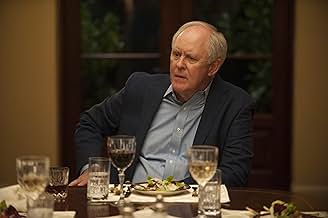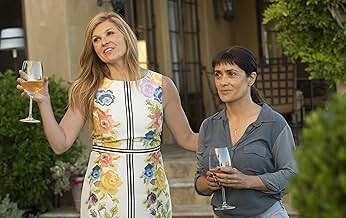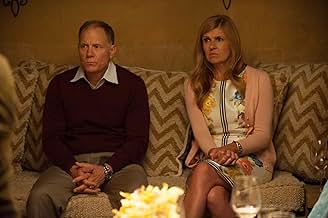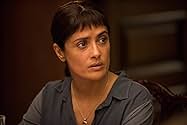A holistic medicine practitioner attends a wealthy client's dinner party after her car breaks down.A holistic medicine practitioner attends a wealthy client's dinner party after her car breaks down.A holistic medicine practitioner attends a wealthy client's dinner party after her car breaks down.
- Awards
- 2 wins & 8 nominations total
Jamon Holmes
- Hospital Patient
- (uncredited)
Anna Lunberry
- Trina Smith - Hospital Patient
- (uncredited)
- Director
- Writer
- All cast & crew
- Production, box office & more at IMDbPro
Featured reviews
Beatriz at Dinner sells itself as the "first important film of the Trump Era," a galvanizing must-see sparring between two embodiment's of the modern American political landscape. In the blue corner the genteel, multi-cultural, bilingual immigrant Beatriz (Hayek) and the red, the boorish super-rich real-estate mogul Doug Strutt (Lithgow). Who will come out on top? Surely not the audience.
The optimal title for this movie should have been Beatriz and the Terrible, Horrible, No Good, Very Bad Day. She begins her morning feeding her dogs and calming her bleating pet lamb before driving down to work at a ramshackle clinic in downtown L.A.. She claims to be a healer - massage, reiki, rolfing - the kind of stuff that would sound like hokum if Beatriz wasn't so emphatically a believer. Her last task of the day involves a long drive to Malibu to meet with a wealthy client. Her car dies on the driveway, thus her hosts reluctantly invite her to a dinner they are throwing to celebrate a new business venture.
The movie's rising action unfolds largely as you would expect. The slight misreading of social cues and awkward culture clashes turn into a snowballing array of devilishly clever faux pas. The dinner itself, while never quite as caustic as it should be, nevertheless showcases the characters as a menagerie of conflicting personalities all containing themselves to conform to social graces.
Then much like Beatriz after one too many glasses of white wine, the movie just seems to forget itself. It sidesteps the character dynamics it so lovingly created and all but deflates any chance of investment. Beatriz and Doug by this point are no longer human but pallid adversarial mouthpieces that don't even talk at one another but through one another. And they do so in the most sanctimonious of ways, diluting what and how they think in the form of talking-points that'd be better served on someone's back bumper. "All tears flow from the same source;" "what the world needs is jobs;" "the world is dying;" "there's way more satisfaction in building things." These are the kinds of grandiose statements you can expect from this movie, dispensed like oh so many socio-political McNuggets.
By the end of the evening, it becomes clear that director Miguel Arteta and screenwriter Mike White have a thematic endgame in mind. What results is a conclusion that no doubt feels forced and too little too late, though given the film's lack of plot, it should get brownie points for actually getting us there. But once we do get there, the shallow vanity, vitriolic banter and the ever present power dynamics all seem to be beside the point. Much like Blue State (2007), Fast Food Nation (2006) and other such movies, Beatriz at Dinner isn't really a movie so much as it is an overt statement that forgot the cameras were rolling.
Have we seriously gotten to the point where we have forgotten how to do satire? Given the high-concept, Beatriz at Dinner could have been a less sophomoric version of The Last Supper (1995) with flutters of Discreet Charm of the Bourgeoisie (1972) painted in for good measure. Instead we're given a film that's just not enough of anything. It's not aggressive enough, its not satirical enough, it's not nuanced enough - heck it's not even sanctimonious enough! It's sits there in a drunken fugue, angrily seething before ambling away in a worrisome state. If I were you, I wouldn't encourage movies like this by following it.
The optimal title for this movie should have been Beatriz and the Terrible, Horrible, No Good, Very Bad Day. She begins her morning feeding her dogs and calming her bleating pet lamb before driving down to work at a ramshackle clinic in downtown L.A.. She claims to be a healer - massage, reiki, rolfing - the kind of stuff that would sound like hokum if Beatriz wasn't so emphatically a believer. Her last task of the day involves a long drive to Malibu to meet with a wealthy client. Her car dies on the driveway, thus her hosts reluctantly invite her to a dinner they are throwing to celebrate a new business venture.
The movie's rising action unfolds largely as you would expect. The slight misreading of social cues and awkward culture clashes turn into a snowballing array of devilishly clever faux pas. The dinner itself, while never quite as caustic as it should be, nevertheless showcases the characters as a menagerie of conflicting personalities all containing themselves to conform to social graces.
Then much like Beatriz after one too many glasses of white wine, the movie just seems to forget itself. It sidesteps the character dynamics it so lovingly created and all but deflates any chance of investment. Beatriz and Doug by this point are no longer human but pallid adversarial mouthpieces that don't even talk at one another but through one another. And they do so in the most sanctimonious of ways, diluting what and how they think in the form of talking-points that'd be better served on someone's back bumper. "All tears flow from the same source;" "what the world needs is jobs;" "the world is dying;" "there's way more satisfaction in building things." These are the kinds of grandiose statements you can expect from this movie, dispensed like oh so many socio-political McNuggets.
By the end of the evening, it becomes clear that director Miguel Arteta and screenwriter Mike White have a thematic endgame in mind. What results is a conclusion that no doubt feels forced and too little too late, though given the film's lack of plot, it should get brownie points for actually getting us there. But once we do get there, the shallow vanity, vitriolic banter and the ever present power dynamics all seem to be beside the point. Much like Blue State (2007), Fast Food Nation (2006) and other such movies, Beatriz at Dinner isn't really a movie so much as it is an overt statement that forgot the cameras were rolling.
Have we seriously gotten to the point where we have forgotten how to do satire? Given the high-concept, Beatriz at Dinner could have been a less sophomoric version of The Last Supper (1995) with flutters of Discreet Charm of the Bourgeoisie (1972) painted in for good measure. Instead we're given a film that's just not enough of anything. It's not aggressive enough, its not satirical enough, it's not nuanced enough - heck it's not even sanctimonious enough! It's sits there in a drunken fugue, angrily seething before ambling away in a worrisome state. If I were you, I wouldn't encourage movies like this by following it.
I'm a great fan of Miguel Arteta and Mike White's work. They travel a road that will take us to unusual places. I don't know if unusual is the right word because all of a sudden everything seems familiar, perhaps is the way Arteta and White got us there that is unusual. Opposite worlds sitting at the same table. Selma Hayek is wonderful and every though that crosses her heart and mind is perfectly visible to us. John Lithgow finds a new and disturbing face to his gallery of startling characters and Connie Britton is sublime as the hostess walking a thin line between empathy and something else. Wow! It really grabbed me and shook me. So, a highly recommended movie trying to survive in a sea of Avengers and remakes. Bravo!
This film is better than its current rating.
I read comments saying that it depicted a bunch of stereotypes of super rich people. But some of them proceeded to confess that they didn't know any super rich people themselves, so...
Kathy, the wife of a rich businessman, who invites Beatriz to stay in her house for dinner, is actually a pretty nice person. Ignorant and probably subconsciously denying the truth about her husband's and Doug's dirty business but still an overall ordinary person, just like most people around us and ourselves who are fortunate enough to live in 'the free world' and refuse to admit we have anything to do with the third world's historical and ongoing suffering.
Another important thing is that this story sets in only less than a day and is told from the perspective of the protagonist Beatriz who is a working-class immigrant, AKA Alice who accidentally steps into the Wonderland of the upper class world and is quietly going 'what the heck is this place and these weird people who keep pretending I'm invisible' during the first half of the film. It's actually very funny, especially if you awkwardly find yourself relating to those fancy rich people more than Beatriz. I think that was the scriptwriter's intention all along.
Frankly, now I just roll my eyes almost every time I hear complaints about poor people blaming rich people for 'their problems', women blaming men about 'their problems', black people blaming white people for 'their problems' in films. Why? Essentially because those films included antagonists who are rich, or men, or white.
I even remember reading similar comments about Wonder Woman which conveniently ignores the fact that Wonder Woman's love interest is a surprisingly open-minded military guy (more than a bit unrealistic for his time) and not to mention her other new friends, most of them male, who are also very likable characters. I wonder what films can possibly satisfy those who can't bare the sight of any regular sexist guy who understandably embodies the social norms (however problematic they are) of their time, or our time. A film about Harvey Weinstein's scandal is gonna come out in the future and some people are gonna hate it so much. And the presence of positive male characters are still not gonna save it from being called another man- hating piece of rubbish. And of course those actresses who are sexually harassed or assaulted are to be blamed, unlike the children in Spotlight whose circumstances are SO essentially different. Women and poor people are definitely two special groups who are mainly responsible for all of 'their problems'.
Beatriz at Dinner is not about slut-shaming rich people. If the mere depiction of morally ambiguous characters (minus Doug who is...let's just say not that ambiguous) equals stereotyping and hating rich people, then I give up. This film sucks. The Big Short sucks. The wolf of the wall street sucks. And so does any film that criticises capitalism and, in this case, its very real consequences of environmental damage and people, domestically and abroad, who suffer from the systematically sanctioned and normalised oppression and mass harm.
I do think the ending is pretty anticlimactic and in an unnecessary way. I won't spoil anything but because Beatriz is herself a morally ambiguous character (who we only thought we knew because she's a massage therapist who likes animals and saves Kathy's daughter from cancer) who has a past we don't know that much about, I think it is perfectly fine to just stop at that climactic scene towards the end and let that be the ending. It could potentially take the depth of the film, at least as I understand it, to a higher level and stimulate more discussion about the important issues raised in it.
I am a thriller junkie and the ending is what stops me from calling this film a thriller-that-pretends-to-be-drama, which is a bit of a shame. I still enjoyed it from start to (almost) the end. One thing that stands out to me the most, more than a month after watching it, is actually a song performed by Beatriz after the dinner. It still resonates with me and possibly also those super rich characters in the film who, like me, cannot even understand its lyrics.
I read comments saying that it depicted a bunch of stereotypes of super rich people. But some of them proceeded to confess that they didn't know any super rich people themselves, so...
Kathy, the wife of a rich businessman, who invites Beatriz to stay in her house for dinner, is actually a pretty nice person. Ignorant and probably subconsciously denying the truth about her husband's and Doug's dirty business but still an overall ordinary person, just like most people around us and ourselves who are fortunate enough to live in 'the free world' and refuse to admit we have anything to do with the third world's historical and ongoing suffering.
Another important thing is that this story sets in only less than a day and is told from the perspective of the protagonist Beatriz who is a working-class immigrant, AKA Alice who accidentally steps into the Wonderland of the upper class world and is quietly going 'what the heck is this place and these weird people who keep pretending I'm invisible' during the first half of the film. It's actually very funny, especially if you awkwardly find yourself relating to those fancy rich people more than Beatriz. I think that was the scriptwriter's intention all along.
Frankly, now I just roll my eyes almost every time I hear complaints about poor people blaming rich people for 'their problems', women blaming men about 'their problems', black people blaming white people for 'their problems' in films. Why? Essentially because those films included antagonists who are rich, or men, or white.
I even remember reading similar comments about Wonder Woman which conveniently ignores the fact that Wonder Woman's love interest is a surprisingly open-minded military guy (more than a bit unrealistic for his time) and not to mention her other new friends, most of them male, who are also very likable characters. I wonder what films can possibly satisfy those who can't bare the sight of any regular sexist guy who understandably embodies the social norms (however problematic they are) of their time, or our time. A film about Harvey Weinstein's scandal is gonna come out in the future and some people are gonna hate it so much. And the presence of positive male characters are still not gonna save it from being called another man- hating piece of rubbish. And of course those actresses who are sexually harassed or assaulted are to be blamed, unlike the children in Spotlight whose circumstances are SO essentially different. Women and poor people are definitely two special groups who are mainly responsible for all of 'their problems'.
Beatriz at Dinner is not about slut-shaming rich people. If the mere depiction of morally ambiguous characters (minus Doug who is...let's just say not that ambiguous) equals stereotyping and hating rich people, then I give up. This film sucks. The Big Short sucks. The wolf of the wall street sucks. And so does any film that criticises capitalism and, in this case, its very real consequences of environmental damage and people, domestically and abroad, who suffer from the systematically sanctioned and normalised oppression and mass harm.
I do think the ending is pretty anticlimactic and in an unnecessary way. I won't spoil anything but because Beatriz is herself a morally ambiguous character (who we only thought we knew because she's a massage therapist who likes animals and saves Kathy's daughter from cancer) who has a past we don't know that much about, I think it is perfectly fine to just stop at that climactic scene towards the end and let that be the ending. It could potentially take the depth of the film, at least as I understand it, to a higher level and stimulate more discussion about the important issues raised in it.
I am a thriller junkie and the ending is what stops me from calling this film a thriller-that-pretends-to-be-drama, which is a bit of a shame. I still enjoyed it from start to (almost) the end. One thing that stands out to me the most, more than a month after watching it, is actually a song performed by Beatriz after the dinner. It still resonates with me and possibly also those super rich characters in the film who, like me, cannot even understand its lyrics.
Found nothing funny at all in this movie. The rich white people are shallow and selfish and make their money by ruining the planet and the lives impacted by their so-called 'developments'.
On the other hand, Beatriz is a highly relatable character bewildered by these people.
On the other hand, Beatriz is a highly relatable character bewildered by these people.
Beatriz (Salma Hayek) is an environmentalist and new age masseuse. She goes into a gated community to work on rich client Kathy (Connie Britton). Kathy gushes over her due to her work with Kathy's cancer-strickened daughter. It's been a bad time for Beatriz. Someone had killed her beloved goat. After her car breaks down, Kathy invites her to the dinner party that night. Beatriz gets into a rolling argument with the main guest, rich arrogant land developer Doug Strutt (John Lithgow). Her family was devastated when a hotel developer moved into her Mexican village. She objects to his big game hunting and her callous treatment of the environment.
This is an interesting little indie of a committed leftist dropped in the middle of the privileged crowd. There is a good little conflict. Lithgow is unrepentant and I really like his "we're all dying" take on the world. I want more of that from writer Mike White. In the end, there is little more of 75 minutes of actual screen time. The movie is begging for more with Hayek and Lithgow. They could have had a free-wheeling debate. Instead, it goes for the cheap kill and forgets it with a dream reversal. This movie goes halfway done the road and then it pulls over to the side of the road before reaching its true destination.
This is an interesting little indie of a committed leftist dropped in the middle of the privileged crowd. There is a good little conflict. Lithgow is unrepentant and I really like his "we're all dying" take on the world. I want more of that from writer Mike White. In the end, there is little more of 75 minutes of actual screen time. The movie is begging for more with Hayek and Lithgow. They could have had a free-wheeling debate. Instead, it goes for the cheap kill and forgets it with a dream reversal. This movie goes halfway done the road and then it pulls over to the side of the road before reaching its true destination.
Did you know
- TriviaThe role of Beatriz was written for Salma Hayek and presented to her as a birthday gift.
- GoofsBeatriz drives from Santa Monica south to Newport Beach, but we see her driving on the 101 Freeway in Agoura Hills, which is many miles northwest not only of Santa Monica but Los Angeles proper.
- Quotes
Beatriz: Doug, you think killing is hard, huh? You wait in the bushes, the animal might outrun you or charge you. It's not easy to get your shot, hm? Try healing something. That is hard. That requires patience. You can break something in two seconds. But it can take forever to fix it. A lifetime, generations. That's why we have to be careful on this earth and gentle.
- SoundtracksAn Ending (Ascent)
Written and Performed by Brian Eno
- How long is Beatriz at Dinner?Powered by Alexa
Details
- Release date
- Country of origin
- Languages
- Also known as
- Una cena incómoda
- Filming locations
- Production companies
- See more company credits at IMDbPro
Box office
- Gross US & Canada
- $7,115,854
- Opening weekend US & Canada
- $141,959
- Jun 11, 2017
- Gross worldwide
- $7,425,391
- Runtime1 hour 22 minutes
- Color
- Sound mix
- Aspect ratio
- 1.85 : 1
Contribute to this page
Suggest an edit or add missing content









































